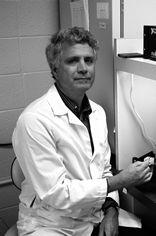Autologous adult human skeletal muscle cells have numerous potential cell transplantation applications, including regenerating heart and skeletal muscle, and for therapeutic protein delivery when genetically engineered to express a recombinant protein. Our research examines the survival and functionality of human muscle cells transplanted in vivo for the development of improved methods for the treatment of numerous endocrine, neuromuscular, and cardiovascular disorders.
Autologous adult human skeletal muscle cells have numerous potential cell transplantation applications, including regenerating heart and skeletal muscle, and for therapeutic protein delivery when genetically engineered to express a recombinant protein. Human myoblasts offer a number of advantages over other cell types for implantation therapies, including a readily available cell source, ease of growth in vitro, and strong safety profile when implanted in humans. In addition, postmitotic muscle fibers formed from myoblasts are long lived (decades), have a high protein synthetic capacity, and the postmitotic muscle fibers (myofibers) are nonmigratory, making treatment reversibility possible (an attractive safety feature). But when implanted as either proliferating myoblasts or differentiated muscle fibers, loss of cell viability and/or function occurs. Our project examines the survival and functionality of human muscle cells transplanted as either proliferating myoblasts or differentiated myofibers into an immunodeficient murine model. Primary human myoblasts isolated by needle biopsy from the vastus lateralis muscle of volunteers are bioengineered into either human 'bioartificial muscles' (HBAMs) containing organized postmitotic muscle fibers in a collagen gel or as a disorganized but tensioned muscle cell layer on bioresorbable polymer scaffolds (MBPS). Proliferating myoblasts, HBAM and MBPS are implanted subcutaneously into immunodeficient NOD-SCID mice. Muscle cell survival as well as transcriptional/translational activity is determined over a two month period and correlated with implant vascularization. Development of a functional interface between cell implants and host blood vessels is assessed by immunohistochemistry, laser doppler perfusion imaging, fluorescent microsphere perfusion, and secretion of recombinant proteins into the systemic circulation. Survival and performance of the implanted cells is studied following the local delivery of angiogenic/vasculogenic/anabolic proteins either short term by their release from the scaffold polymer, or long term by genetically engineering the muscle cells with replication deficient viral vectors. It is hypothesized that ex vivo differentiated and genetically 'enhanced' skeletal muscle fibers that are rapidly vascularized will provide the best functional skeletal muscle implant technology. Successful completion of this project will be a step toward the development of improved methods for skeletal muscle cell transplantation for the treatment of numerous endocrine, neuromuscular, and cardiovascular disorders.
20062007 Principal Investigator, NIH Grant R41AR053386
"Electromechanical Micropost Array to Detect In Vitro Muscle Contraction"
Total Direct Costs$84,373
20062007 Principal Investigator, NIH Grant R43 Phase 1 SBIR
"In Vitro Matrix-Cell Interaction in Bioartificial Muscle"
Total Direct Costs$74, 800
20052007 Principal Investigator, Slater Technology Funding of Myomics, Inc.
Total Direct Costs$225,000
20042006 Fellowship, NIH Senior National Service Research Award, Harvard University
"Vascularization of Tissue Engineered Skeletal Muscle"
Total Direct Costs$72,000
20012003 Investigator, DARPA N66001-01-C-8004
"Bioartificial Muscles as Force Generators"
Total Direct Costs$350,000
2000-2003 Principal Investigator, National Institute of Standards and Technology, Advanced Technology Program, 70NANB9H3011
"Bioartificial Muscle Implants for Sustained Protein Delivery"
Total Direct Costs$2,570,000
1998-2005 Principal Investigator, NASA Life Sciences Grant NCC2-1062
"Effect of Space Travel on Skeletal Myofibers"
Total Direct Costs$911,490
1998-2003 Principal Investigator, National Institutes of Health R01 HL60502
"Tissue Engineered Myofibers for Gene Therapy"
Total Direct Costs$355,185
1998-2002 Principal Investigator, National Institutes of Health R01 AG15415
"Bioartificial Muscles for Gene Therapy"
Total Direct Costs$925,770
1999-2001 Principal Investigator, National Institutes of Health R44 AG14958
"Attenuation of Muscle Wasting with Growth Hormone"
Total Direct Costs$750,000
1998-2001 Principal Investigator, NASA Life Sciences Grant NAG2-1205
"Growth Factors and Tension-Induced Skeletal Muscle Growth"
Total Direct Costs$714,912
1998-1999 Principal Investigator, NASA Subcontract NCC2-1062
"Science Evaluation of the Cell Culture Unit for the International Space Station"
Total Direct Costs$82,836
1997-1998 Principal Investigator, National Institutes of Health R43 AG14958
"Attenuation of Muscle Wasting with Growth Hormone"
Total Direct Costs$78,381
1995-1998 Principal Investigator, NASA Life Sciences Grant NAGW-4674
"Growth Factor Involvement in Tension-Induced Skeletal Muscle Growth"
Total Direct Costs$644,187
1994-1998 Principal Investigator, NASA Life Sciences Grant NAG2-914 for Shuttle Flight Experiments "Effects of Space Travel on Skeletal Myofibers"
Total Direct Costs$230,053
1994-1996 Investigator, National Institutes of Health Grant R01 AG10942
"Growth Hormone and/or Exercise for the Frail Elderly"
Total Subcontract Direct Costs$121,813
1989-1996 Principal Investigator, National Institutes of Health R01 AR39998
"Prostaglandins and Skeletal Muscle Hypertrophy In Vitro"
Total Direct Costs$931,228
1986-1995 Principal Investigator NASA Life Sciences NAG2-414
"Growth Factor Involvement in Tension-Induced Skeletal Muscle Growth"
Total Direct Costs$704,913
1993-1997 Consultant for research projects at University of California, Los Angeles, University of Illinois, University of Nevada, INSERM (Paris), Weiss Center for Research, Brown University Section of Artificial Organs, Cytotherapeutics, Inc., Rhode Island Hospital
1992-1997 Grant Mentor, National Institutes of Health HL07725
Short Term Research Training for Minority Students
1992 Principal Investigator, The Miriam Foundation
"Molecular Mechanisms by which Mechanical Forces Stimulate Cardiac Hypertrophy: A New Model System"
Total Direct Costs$28,000
1988-1989 Principal Investigator, National Institutes of Health BRSG S07 RR05818
"Skeletal Muscle Development In Vitro: New Model System"
Total Direct Costs$21,285
1985-1989 Principal Investigator, National Institutes of Health R01 AR36266
"Skeletal Muscle Development In Vitro: New Model System"
Total Direct Costs$255,319
1982-1985 Principal Investigator, National Institutes of Health BRSG S07 RR05818
"Skeletal Muscle: Activity Versus Growth"
Total Direct Costs$19,063
1981-1985 Principal Investigator, National Institutes of Health R01 NS 16753
"Regulation of Skeletal Muscle Growth and Atrophy"
Total Direct Costs$129,412
2012 - present Consultant, Wyss Institute, Harvard University

